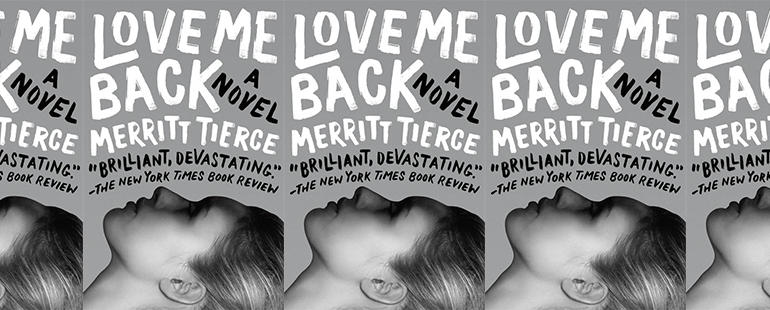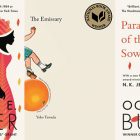The Dark Depths of Motherhood in Love Me Back

Writers spill a lot of ink about mothers, penning portraits of bad mothers (see Becky Sharpe in William Makepeace Thackeray’s Vanity Fair) and good mothers (see Marmee in Louisa May Alcott’s Little Women), sentimental reminiscences (see Gertrude Morel in D.H. Lawrence’s Sons and Lovers) and scathing portrayals (see Mary in Sapphire’s Push). But few writers have probed the extremes of motherhood, pushed past characterization, and peered straight into the terrifying heart of what it means to be a mother and what it costs; how golden and sunlit the highs, and how dark the depths.
Love Me Back, Merritt Tierce’s 2014 novel, does this in fierce fashion and may be one of the most beautiful and honest portraits of motherhood I have ever read. It is also dark and disturbing, and is as much about punishment as it is about motherhood, and how the two intertwine. In the opening chapter, we meet Marie, a waitress at an upscale steakhouse in Dallas, as she is serving dinner to four surgeons and their families. “The one I liked, Cornelius, was the only one I didn’t sleep with,” Marie says. She’d met the men at a previous event, and they have come back to her restaurant presumably for the thrill of having their girlfriends and wives in close proximity to a woman they’ve just slept with. This encounter culminates with one surgeon sexually assaulting Marie discreetly while she is standing at the table describing the night’s specials. Marie is unfazed, genial even, absorbing this assault with something like bitter resignation. The other guests smile and laugh at Marie’s jokes, unaware of anything other than their lovely night out. It is a startling, ugly way to open the book, and yet it is necessary for readers to see the world in which Marie moves, a world she has chosen for herself, a world she continually remakes throughout the novel: “Whatever is in me that makes decisions is now full of an accretion of plaque, the chalky consequence of, paradoxically, so many hollow moments.”
Tierce takes us through Marie’s history as a waitress, beginning with her first day at Olive Garden and culminating with her job at the steakhouse, which is referred to as The Restaurant and attracts celebrities, sports figures, Texas businessmen, and those who find themselves now dedicating their lives to servicing the often bizarre and outrageous whims of this clientele. A second history runs through this narrative: that of Marie the Yale-bound high school student who made love to a boy on a youth group trip to Mexico and shortly found herself pregnant, dropped out, and married. She gives birth to a daughter, Ana, and moves into an apartment with her new husband, but though they are able to build a routine, they struggle to build a life. “Eating scrambled eggs or toast in the kitchen I was afraid for her,” Marie says. “I cried and moved slowly all day long. I thought it must be bad for her to have that as her mother.” And it’s not only for her daughter that she worries. Marie is plagued by visions of sharp objects falling on her head or impaling her, and it is only through waitressing, inside the blur of a packed house during the lunch rush, that she is able to reduce those thoughts into a grey haze.
Love Me Back has been called a restaurant novel, and this is fair given that most of the story takes place inside restaurants teeming with sordid customers and sociopathic employees. Marie enumerates the lessons she’s learned as a waitress, number one being, Don’t fuck up. This mantra is repeated so often that it is easy to see how Marie has taken it to heart, and what she will do to herself when she sees that she has, in fact, fucked up. Her marriage to the father of her child, for instance, collapses after one year, when Marie confesses that she has cheated on him with a string of men. Tierce writes unsparingly about these affairs, demanding that the reader be confronted with Marie’s failings in the same way Marie will not allow herself to look away from her mistakes. Marie also reveals that she has been burning herself, and this self-harm escalates throughout the book as her inner life gets more out of control. Her ex-husband moves across town and Marie sees her daughter sparingly—no one, including Marie, thinks she should be left alone with her daughter.
Marie’s affairs quickly become less about personal exploration and more about punishing herself. She sleeps with men she is repulsed by, men she despises. She allows herself to be hurt and humiliated, both in private and in public. In one gruesome scene, a coworker has ordered Marie to go outside and have sex with a stranger in a parking lot, during which the coworker pours beer over Marie and repeatedly slaps her in the face. While this is going on, Marie thinks about her daughter; the reader realizes it is for her that Marie punishes herself. It is her profound love for her daughter, and her awareness that she is unfit as a mother, that makes her do the things she does. “He poured beer on me and hit my face and called me a bitch and hit my face, and I thought about her sleeping in her dad’s living room half an hour away. I wondered which pajamas she was wearing and if he [her dad] had found her missing favorite stuffed fox yet.”
It is difficult to put into words what motherhood means, what it physically, emotionally, psychically, spiritually, and cosmically means. And so, Tierce has then done a clever thing. Like the Anton Chekov quote about the moon—“Don’t tell me the moon is shining; show me the glint of light on broken glass.”—Tierce has not shown us motherhood but rather the reflection of it, the absence of its full-frontal glow, and how it exists only in a glint on a piece of broken glass. In every choice Marie makes—to do another line of cocaine, to sleep with a man she knows will harm her, to work double shifts, holidays, private events, to always say yes, yes, more—Tierce shows us Marie’s profound love for her daughter. The punishments she inflicts upon herself for her failure to be a good mother to Ana add up to a far greater portrait of the costs of motherhood than if Tierce had chosen to write directly into the issue, creating a character so devoted and nurturing she would be the Platonic ideal of maternity. It is by showing us the glint on the glass that we are able to see the true cost of motherhood: that a mother’s love for her child may be so great that she will destroy herself one bump, one man, one burn at a time for failing to live up to that love.
“I don’t know what to give her,” Marie says to a co-worker who has his own daughter. “Bullshit, he said, you give her love, you give her time, you give her attention.” The irony is that, in Marie’s way, she has given these things to her daughter. She is just unable to turn these feelings outward. She can experience only the reflection of motherhood as well, a glare that points directly at her, and never at her daughter. In the same way, only by looking indirectly at Marie’s experience of motherhood are readers able to see its full shape. And what we see is ugly and disturbing, but also profound and beautiful and, most importantly, true. In a word, it’s everything.
This piece was originally published on May 10, 2021.



